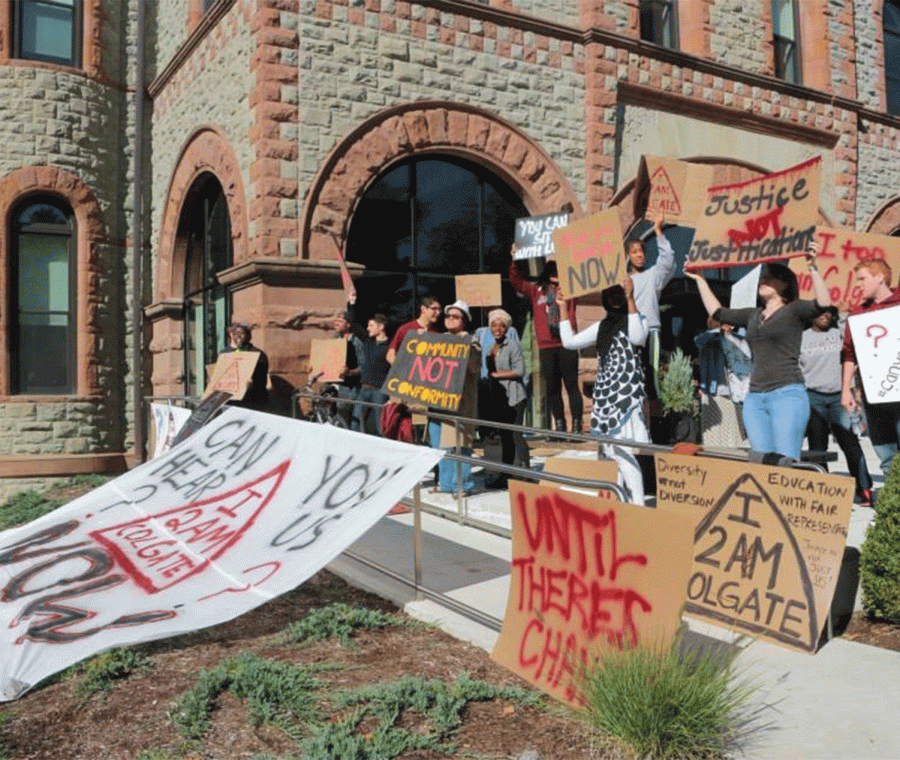The ACC Fight Continues
In November of 2001, around 70 students protesting a variety of racially insensitive incidents on Colgate’s campus occupied the admission building. Thirteen years later (in true Colgate fashion), more than 300 students participated in a sit-in in the Hurwitz Admission Center. Only this time, the protest was aimed at policies and attitudes surrounding not just race, but also sexual orientation, ability, gender and socio-economic class on our campus. Peers, professors and those outside of the Colgate community have asked me the same question: why now? What motivated us to form the Association of Critical Collegians (ACC) and finally take action in September of 2014? What was the “breaking point” so to speak?
As a member of the ACC who participated in the sit-in and helped coordinate media and communications during and after the protest, I am well aware of the problems on our campus and have been for a long time. I see the protest as a combination of fed-up seniors, like myself, with a newfound confidence to act, and first-year students, who in their first few weeks of school either had a friend experience microagression(s), experienced it themselves, witnessed it happening around them or just saw how unaccepting and marginalizing our campus can be.
As I told the Leadership Conference on Civil and Human Rights during an interview about the sit-in, the administration was sweeping issues under the rug and not changing. It was pretty clear that we had to do something to make them listen. This national non-profit, along with the other advocacy organizations and universities that helped spread our message, acknowledged that what happened at Colgate is part of a larger trend. Student-organized activism is all the rage these days, which definitely helped our cause. New sources were more willing to publicize our movement and solidarity came pouring in from other universities and colleges. Like many of the recent college campus protests, the ACC wanted action, not just words.
Looking forward, we absolutely expect the Colgate administration to follow through on their commitment to combat these unacceptable incidents and the overall atmosphere of exclusivity. As many of you know, there is now video surveillance on the Colgate cruisers. Hopefully, the installation of these monitors will significantly decrease, if not eliminate, the many microagressions that occurred on a regular, perhaps daily, basis. Such behavior is completely unacceptable anywhere on campus, let alone on school-provided transportation. No one should feel targeted or unsafe on their way to class or coming back from downtown.
Additionally, the administration has held meetings about housing and other related issues that were on our list of demands. The rest remains to be seen. In my opinion, what will make the biggest differences are changes that really get to the core of social inequality on Colgate’s campus. For example, wide-reaching diversity training, revising the University’s core curriculum to include the study of systemic power inequities, implementing stronger disciplinary action for hate speech of any kind and so on.
The ACC is keeping a watchful eye on the administration to make sure that they keep their promises. We have every intention to put pressure on them if necessary and, if all else fails, we can always go right back to the admission office. Our peaceful sit-in brought awareness to the increasing problem of microaggressions and marginalization, as well as a lack of inclusive policies and attitudes at Colgate. The ACC continues to hold meetings, not only to keep tabs on progress post-protest but also to stay active in related issues both worldwide and closer to home for the Colgate community. We planned a day of solidarity against police brutality and held a meeting to discuss what we can do to show our support for the sit-in at Syracuse University. The ACC and anyone else who participated in the sit-in are part of a larger movement of students demanding social change, and we move forward with this in mind.









